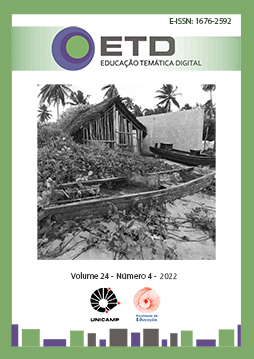Abstract
This paper will be built upon reflections about Bilingual Education for the Deaf in relation to educational policy and linguistic; and it will aim at discussing the legislation to the education for the Deaf, Deaf Studies regarding Deaf activism. This article will deal with the actions taken within the Deaf policy idealized by FENEIS presenting of the new achievement of the Deaf movement: the bilingual education for the Deaf is now a teaching modality determined by the LDB. Based on these theoretical assumptions, this paper will make use of document will presents and empirical observations to presentig the main points of negotiation and the strategies to foster an educational and linguistic policy in view of implementation of inclusion that offers a pedagogical training to teachers that is based on the culture and identity of Deaf people and also on the linguistic uses throughout the whole schooling process; and to adjust of curricular guidelines to be made available after the new Law 14.191/2021. By doing theses analyses, we hope that bilingual education for the Deaf in LDB becomes a reality in teaching practices toward Deaf students and that it can be promoted and built in all educational offices and departments, favoring, thus, the true school inclusion, the educational structures needed, the appreciation of the Deaf culture, identity and language rights. Therefore, the basic curricular directives should be considered under a true bilingual perspective, promoting the basic principles for Deaf education: quality of teaching, access to knowledge and staying in school.
References
BARLACH, Lisete et al. Conceito e resiliência aplicada ao trabalho na organização. Revista Internacional de Psicologia, v. 42, n. 1, p. 101-112, 2008.
BRASIL. Constituição da República Federativa do Brasil de 1988. Disponível em: http://www.planalto.gov.br/ccivil_03/constituicao/constituicao.htm. Acesso em: 10 fev. 2022.
BRASIL. Lei nº 9.394, de 20 de dezembro de 1996. Estabelece as Diretrizes e Bases da Educação Nacional. Disponível em: http://www.planalto.gov.br/ccivil_03/leis/l9394.htm. Acesso em: 10 fev. 2022.
BRASIL. Lei nº 10.436, de 24 de abril de 2002. Dispõe sobre a Língua Brasileira de Sinais – Libras e dá outras providências. Disponível em: http://www.planalto.gov.br/ccivil_03/leis/2002/l10436.htm. Acesso em: 10 fev. 2022.
BRASIL. Decreto nº 5.626, de 22 de dezembro de 2005. Regulamenta a Lei nº 10.436, de 24 de abril de 2002, que dispõe sobre a Língua Brasileira de Sinais – Libras, e o art. 18 da Lei nº 10.098, de 19 de dezembro de 2000. Disponível em: http://www.planalto.gov.br/ccivil_03/_ato2004-2006/2005/decreto/d5626.htm. Acesso em: 12 mar. 2022.
BRASIL. Lei nº 13.005, de 25 de junho de 2014. Aprova o Plano Nacional de Educação – PNE e dá outras providências. Disponível em: http://www.planalto.gov.br/ccivil_03/_Ato2011-2014/2014/Lei/L13005.htm. Acesso em 15 abr. 2022.
BRASIL. Lei nº 14.191, de 3 de agosto de 2021. Dispõe sobre a modalidade de educação bilíngue de surdos na LDB. Disponível em: http://www.planalto.gov.br/ccivil_03/_ato2019-2022/2021/Lei/L14191.html. Acesso em: 20 fev. 2022.
CAMPELLO, A. R e S.; REZENDE, P. L. F. Em defesa da escola bilíngue para surdos: a história de lutas do movimento surdo brasileiro. Revista Educar em Revista, Curitiba, Edição Especial n. 2/2014, p. 71-92.
DORZIAT, A. Educação de surdos em tempo de inclusão. Revista Educação Especial, v. 28, n. 52, p. 351-364, 2015.
FENEIS. Nota sobre educação de surdos na meta 4 do PNE. Rio de Janeiro: Feneis, 2013.
FERNANDES, S. de F. Educação bilíngue para surdos: identidades, diferenças, contradições e mistérios. tese (doutorado em estudos linguísticos) – Universidade Federal do Paraná, Curitiba, 2003.
FOUCAULT, Michel. Os intelectuais e o poder. In: FOUCAULT, Michel. Microfísica do Poder. Rio de Janeiro: Edições Graal, 2004.
GARCIA, Célio. Poder, normalização e violência: Incursões foucaultianas para a atualidade. In: PASSOS, Izabel C. Friche (Org.). Resistência a partir de Foucault. Belo Horizonte: Autêntica Editora, 2008.
KUBASKI, Cristiane; MORAES, Violeta Porto. O bilinguismo como proposta educacional para crianças surdas. Curitiba, PUCPR, 2009.
LIMA, M. D. Política educacional e política linguística na educação dos e para os surdos. 454f. 2018. Tese (Doutorado em Educação) - Universidade Federal de Uberlândia, 2018. Disponível em https://respositorio.ufu.br/handle/123456789/24583 . Acesso em 14 fev. 2022.
LODI, A. C. B.; LACERDA, C.B.F. Uma escola duas línguas: letramento em língua portuguesa e língua de sinais nas etapas iniciais de escolarização. Porto Alegre: Editora Mediação, 2009.
LOPES, M. C.; VEIGA-NETO, A. Marcadores culturais surdos: quando eles se constituem no espaço escolar. Perspectiva, Florianópolis, v. 24, nesp., p. 81-100, jul./dez. 2006.
MOURA, M. C.; LODI, A. C. B; PEREIRA, M.C. Língua de Sinais e Educação de Surdos. v. 3. São Paulo, TEC ART, 1993. Série Neiropsicologia.
ONU. Declaração Universal dos Direitos Humanos. Representação da Unesco no Brasil. 1998. Disponível em: http://unesdoc.unesco.org/images/0013/001394/139423por.pdf. Acesso em: 16 jan. 2022.
QUADROS, R. M. de. Educação de surdos: aquisição da linguagem. Porto Alegre: Artes Médicas, 1997.
SOUZA, R. M. Que palavra que te falta?: linguística, educação e surdez. São Paulo: Martins Fontes, 1998.
UNESCO. Declaração Mundial sobre Educação para Todos: satisfação das necessidades básicas de aprendizagem. 1990. Disponível em: http://unesdoc.unesco.org/images/0008/000862/086291por.pdf. Acesso em: 26 fev. 2022.
UNESCO. Declaração de Salamanca: sobre princípios, políticas e práticas na área das necessidades educativas especiais. 1994. Disponível em: http://portal.mec.gov.br/seesp/arquivos/pdf/salamanca.pdf. Acesso em :17 fev. 2022.

This work is licensed under a Creative Commons Attribution-NonCommercial-NoDerivatives 4.0 International License.
Copyright (c) 2022 ETD - Educação Temática Digital


